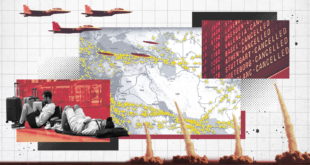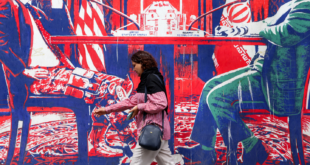President Recep Tayyip Erdogan has said he is supplying militias backing the Tripoli government with arms, armoured vehicles and drones.
Turkey’s support of fighters against eastern-based Libyan commander Field Marshal Khalifa Haftar’s has been no secret, but recent statements from Ankara mark a particularly brazen step.
The Field Marshal’s Libyan National Army has consistently accused Turkey of aggressively violating Libyan sovereignty and bolstering groups, including extremists, who the LNA says run Tripoli, propping up the UN-backed government.
Two weeks ago, President Recep Tayyip Erdogan, for the first time, admitted his country was supplying arms to the militias of western Libya who are fighting the LNA for Tripoli.
The Erdogan government has allegedly provided armoured vehicles and weapons, with even the Turkish president conceding it had provided drones.
Libyan militias supported by Ankara published photos purporting to show the new arsenal. Unverified videos shared online appears to show Turkish-speaking advisers showing Libyan fighters how to operate the arms.
Turkey has also been the home of Libyan rivals to the field marshal’s camp, some of whom are sanctioned by the United Nations.
“Following the creation and initial success of the Justice and Construction Party – the Libyan branch of the Muslim Brotherhood, fashioned in the likeness of Erdogan’s Justice and Development Party – Turkey began to see Libya as important to its attempt to boost its influence by cultivating the political Islamist groups that emerged across the region during the Arab uprisings,” a report by the European Council on Foreign Relations said last week.
“After the onset of Libya’s civil war in 2014, Turkey became a haven for Libyan exiles – including political Islamists – as one of the rare countries Libyans could travel to, and conduct business in, without encountering significant red tape.”
On April 4 the LNA, which controls eastern Libya, launched its long-awaited assault on Tripoli, vowing to cleanse the city of the militias that have held court and run an effective cartel that has extorted the capital.
The LNA and Ankara have always been at odds but the fierce upturn in rhetoric happened after anti-Haftar forces took the strategic town of Gharyan to the south late last week.
Tensions have now reached unprecedented levels and the LNA has hit back. Over the weekend it said it would target Turkish ships operating in Libyan waters, ordered attacks on any assets owned by the Ankara government and banned flights between LNA-controlled territories and Turkey.
On Sunday night, an LNA spokesman said it had destroyed a Turkish drone from Tripoli’s Mitiga airport having also made similar statements since fighting erupted in early April.
The LNA also launched an aerial torrent on western Libya after losing Gharyan.
Turkey itself has threatened the field marshal’s forces after accusing it of detaining six Turkish sailors off the port of Brega. Ankara now says they have been released.
Turkey is particularly close to the city of Misrata, to the east of Tripoli.
When fighting broke out it was the battle-hardened revolutionary fighters of Misrata to the east were among those to join forces to repel the LNA and its local allies.
Ankara also has a consulate in Misrata and local officials are often pictured at high-profile events next to important political and commercial figures in the city.
Misrata’s port, which counts for roughly 60 per cent of Libya’s imports according to local officials in 2018, is where some of the weapons from Turkey have been allegedly been brought in.
Another intense source of ire is Turkey’s harbouring of figures the LNA regard as terrorists. Among them is Salah Badi, sanctioned by the UN last year for undermining the political progress and currently engaged in the Tripoli war.
It has provided a permanent base for Abdul-Hakim Belhaj, the former Libyan Islamic Fighting Group leader, who operates openly from an office block in Istanbul.
The former Grand Mufti, Sadiq Al Ghariani, who has been banned from the UK for his radical comments, also spends long periods of time in Turkey but recently returned to western Libya.
 Eurasia Press & News
Eurasia Press & News


